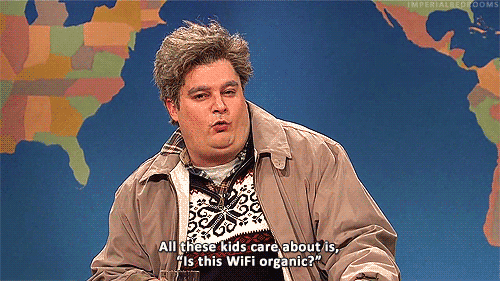
Babble
I was kind of stumped on this blog for a while. I’m not necessarily unstumped, but I think it’s time to just write anyways.
For starters, I really loved The Twitter Essay. I’m not exactly an active user of Twitter myself, but I felt like I could still connect with it well enough in regards to texting and online-writing in general. I found myself saying “yes!” to myself a lot while reading it, but instead of copying and pasting the whole thing, here’s one bit I particularly enjoyed: “He points out that the average texter is aware when they are breaking the rules. He or she is aware of the ways that text-message-speak distorts Standard English — aware, in fact, to the point of revelry.”
A lack of recognition for the creativity and attention to detail that young people put in to texts and tweets is, I think, one of the most frustrating things about the “old-fashioneds” argument. To say that these new technologies are ruining literacy skills and killing communication is just plain wrong. This kind of literacy might not directly translate to academic journals & scholarly articles, but to refute the fact that there are no rules or art to texting, one only has to witness a couple girls draft a message to someone they have a crush on. Alternatively, you could compare text posts on Twitter or Tumblr and try to explain why some are funny and some aren’t. It’s not just the words you have to pay attention to, it’s the presentation, and it can be subtle: punctuation & capitalization (or the lack of it), intentional misspellings, font, effects like italics or strikethrough, subscript or superscript, spacing, format, et cetera. There is a lot that goes into these posts, and they’re just “casual.”
Stommel did a pretty great job of wrapping up his ideas in the article’s conclusion, but he also pretty much said it right towards the start: “This isn’t to say that there haven’t been other wondrous moments in the evolution of human language, but there has not (and may never be again) a moment just like this one, a moment where the very fabric of how we speak and how we express ourselves through language has become so tenuous that every new textual utterance threatens to either devolve into gibberish or reinvent the very way we speak and write.
The evolution of written language is speeding up at an exponential rate, and this necessitates that we, as writing teachers, reconsider the way we work with language in our classrooms.”
That’s such an exciting thing to read. I do have a knee-jerk reaction to being a little scared– everything’s a-changin’!– but it appeals to my creative side and my curious side. If this idea (and others) are embraced more, it could help make new generations more comfortable and interested in our classes and field. And even though I’m pretty much a part of this culture right now, I know there will be much more for me to learn in the future– and a lot of that will come from my students.
2 Replies to “Babble”
great blog.
With everything changing, will our standard of what English consists of be the same in 5 years. In the past English has taken generations to change one rule or gramatidal correction. But now in just a matter of years, we see the language of text change. Certain abbreviations have become taboo. Your use of certain text can even date you. So to add to your wonderfull post, what we can most likely will see in the future is the change of what we call English. And even though it is scary to think about, we should embrace the change and let our language evolve as our society does.